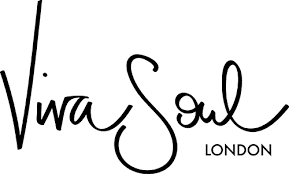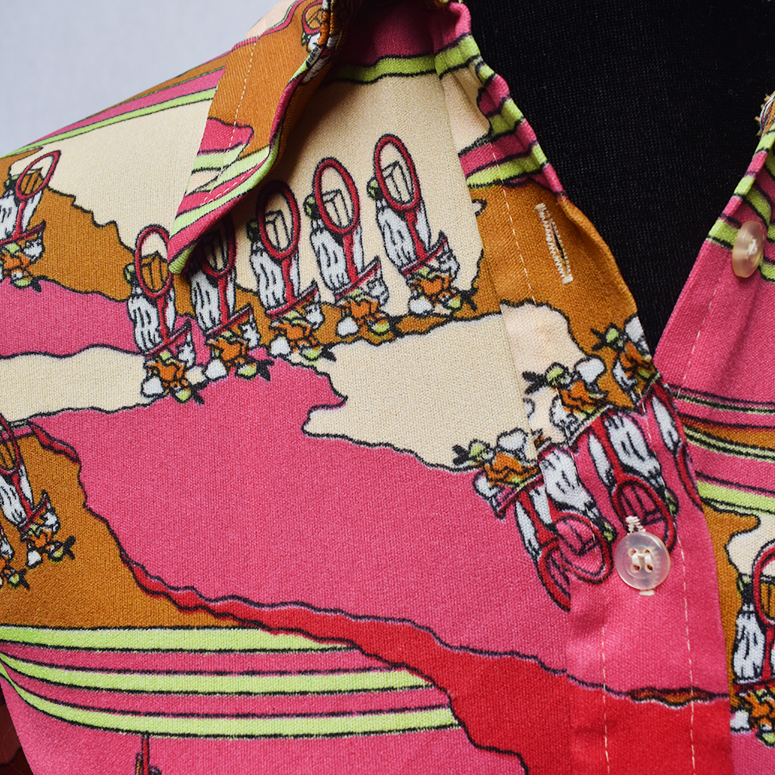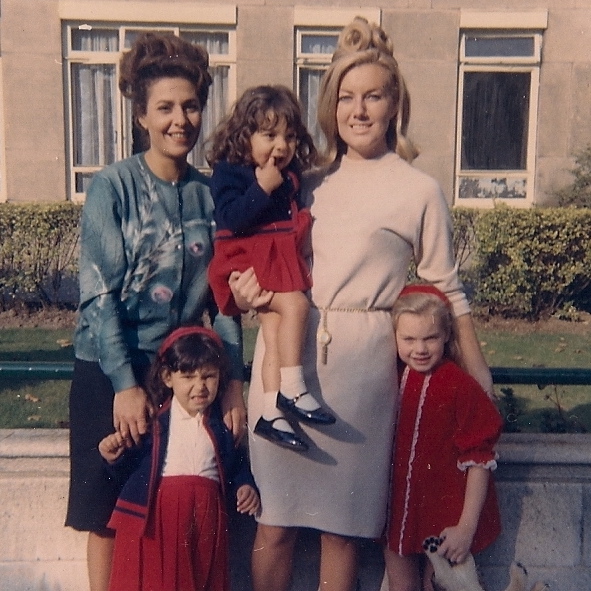Viva Soul London
Based in: Battersea, London, UK
Founded in: November 2016
Founded by: Lydia Jones (just married so now Lydia Di-Maria!)
Shop: Online, shipping worldwide from www.vivasoullondon.com – Also on Etsy.com and NotOnTheHighStreet.com
Price range: £5-£100
Instagram: @vivasoul.london
Why we love them:
You can see and feel how carefully selected the pieces in the assortment at Viva Soul London are, and you can easily feel how Lydia put her heart and soul into the whole concept. She offers you nostalgic pieces both to fill your closet but also for your home. It’s fun, playful, inclusive, genuine and it’s being done with love and passion!
Hi Lydia! Why did you start Viva Soul London?
Like most traders, I started VSL from my overflowing wardrobe! I got just as much of a thrill sourcing vintage as I did wearing it, and found I’d be buying and keeping pieces that would never fit me, but I thought deserved to be homed and loved.
Vintage and secondhand fashion wasn’t as popular and accessible back in 2016 as it is now, and having a website that sold it was quite a good idea. I’m a graphic designer, so it also gave me a platform to sell my illustrative work which was vintage-themed. Selling homewares as well, my initial concept was that Viva Soul London had something for everyone – a piece for your wardrobe, a piece for your home or a gift for a friend; a vintage lover’s one-stop shop.
How do you pick your products and what you sell?
Buyers and wearers of vintage love it because of its uniqueness – colour palettes, prints, tailoring and material quality are just not the same today. I look out for all of these things when sourcing items for my stock room. I’m drawn to all eras, selling mainly pieces from 1940s-1980s. Another USP for VSL was that the stock should be accessible to everyone, which means the prices are affordable and competitive with the high street, and I stock a wide range of styles and sizes. As a plus-size woman myself, I particularly look out for vintage in UK sizes 16+. It’s harder to find and many traders unfortunately choose not to stock plus sizes, often saying that it doesn’t exist. That simply isn’t true and I do my best to prove these traders wrong!
Tell us more about the “Soul Love Vintage Fair” concept?
Viva Soul London has traded both in London and out of the city. When trading at vintage fairs in London, I found my “everyday” pieces were often overshadowed by more specialist traders, selling much older pieces, or designer items for a lot more money.
Pitch fees are high, which would mean I’d have to sell a great number of pieces to make back what I spent to be there. At rural fairs, the pitch fees were much lower and the other traders far more relaxed, but the footfall was far less than in London. Soul Love started as a physical fair, our first event launching in October 2019. I wanted to bring together the two types of fair mentioned above – a rural, relaxed feel in the big, busy city, with pitch prices that like-minded traders could afford. The first fair was a success but then… COVID-19 hit! Since the pandemic, Soul Love Vintage Fair has become a virtual fair.
I was happily surprised at how well the virtual event concept was received, and still is; traders sign up and are promoted on the @soullovevintagefair Instagram account.
On the day we direct customers to their individual accounts and traders sell from there. It isn’t a unique idea, but some virtual fairs charge as much as £40 to take part. To me, this is far too expensive for a fair where no venue rental is involved. In the spirit of being inclusive, I charge a £5 sign-up fee, plus additional options for promotion if they choose to spend more.
The Soul Love family has grown into a lovely group of traders (80 individual traders have taken part this year), and we offer each other support and friendship both on fair days and in between. I’m very proud of what Soul Love has become.
What have been and are the major challenges?
The pandemic offered both challenges and rewards, depending on customers’ income and job-security, I found. As a whole though, trading in vintage does have certain obstacles, the biggest one of course being that there’s only one of every item!
There’s no room for “finding one in a larger size”, but I always say to my customers that when an item ticks the magic three checkboxes (you love it, you can afford it, it fits), it’s even more of a match made in heaven. As a small business in general, it’s always hard to go up against the big names on the high street and online. However in the five years that I’ve been trading I’ve found that people are thinking more and more about how to shop small, local and sustainably.
What has been the largest gain?
Of course there is a lot of responsibility that comes with running your own business, but it does mean that you’re free to do what you want with it. Viva Soul London is primarily a one-woman venture, which I couldn’t do without the help of my family and friends who assist at events, car journeys, photo shoots and general moral support! It’s such a great feeling when a customer, whether I know them or not, finds something they love for sale. It gives me reassurance that I’m doing something right!
What do you think needs to change now in the fashion industry to make it more sustainable?
I’m in no way an expert but even I can see that there is a lot of work that needs to be done. I read recently that since 2000, European fashion brands went from releasing just 2 new collections per year to up to 24, and 13 million items of clothing go to U.K. landfill every week. It’s horrendous. Style isn’t disposable; one item could be dressed an unlimited numbers of ways and when you open a magazine, trends of the past are always coming back into fashion. So why do the industry feel the need to send to landfill and create new at such an alarming rate? It would be great to see more recycling/reuse initiatives in our high street stores, and advice on how to change-up items for a new look, rather than the focus being on constantly buying new.
What is “greenwashing” according to you and what can producers and consumers do to avoid it?
Greenwashing is a marketing tool used by businesses to appear eco-friendly, from using green in their branding to misleading language and statistics. I know I’ve done my bit for the environment when I buy second-hand or vintage. I have been an active part in the recycling process; I’m not relying on a company to tell me that at some point in an item’s history, it was sustainable. Researching a company’s manufacturing methods can be confusing and unclear, sometimes intentionally. Just stick to how you can make an impact, and don’t trust that they will!
What would you advise consumers to do who seek to create a sustainable closet and lifestyle?
It’s an overused statement but it really is as simple as this three-word phrase: “Reduce, Reuse, Recycle”. When it comes to your closet:
Reduce: stop for a moment and think about whether you really need something brand new, or whether you can make use of something you already have. This isn’t to say that you shouldn’t buy new things (or “new-to-you” as we say in the vintage world), but if everything you own has a meaning and a reason to be in your closet, it’ll bring you a lot more joy.
Reuse: Creativity is key. If I have something in my wardrobe that I haven’t worn in a while, I make an active effort to do so. I start an outfit with that item (even if it’s a pair of earrings) and build a look from there. I’m often surprised at what I come up with – it’s like building a jigsaw puzzle but getting a different result every time!
Recycle: It’s inevitable that items will end up being passed on, but if you’ve brought it into your home, see it as your duty to pass it on responsibly. When saying goodbye to an item, I always try to think if I know someone who would like it (did someone compliment it, is it my friend’s size?) before it goes in a bag for the charity shop. One of my pet hates is handing over my money to big companies when I could be supporting small businesses instead. If I need to buy something, I try to search on Etsy for a small business alternative, or buy directly from a seller to avoid big, corporate businesses getting a cut. They don’t need your money to survive, but independent sellers do!
What’s the best thing about having your own store?
I’m a creative and in my day job as a graphic designer I don’t always get the chance to be as adventurous with my work as I’d like to be. With Viva Soul I’m in control, so I can produce the artwork I’d like and that freedom also extends to how I market my business. I enjoy coming up with a series of posts for my social pages, so currently I do direct comparisons of my stock with items found on Net-A-Porter, as well as highlighting pieces that align with current trends in monthly fashion magazines. In theory having your own business means you can be in charge of your own working hours too, but as I love what I do, I often find myself working around the clock! Must get better at managing that.
By actually copying this from your site, who’s your fantasy dinner date?
As you’ll see from my answer on my site, my fantasy dinner date is Elizabeth Taylor – arguably the most beautiful woman to have ever lived. I think if you’re having dinner with Liz, you’re bound to be in for some glamour and fun. What more could you want from a dinner date?
Published on A Sustainable Closet’s blog



